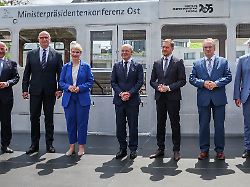“There must be no compromises”
Eastern bosses are demanding further economic development from the federal government
6/22/2023, 6:56 p.m
The Ministry of Finance wants to cut regional economic development in eastern Germany. The local heads of government warn against this step at a conference of prime ministers. With a view to the hydrogen expansion and the shortage of skilled workers, they are demanding more commitment from the federal government instead of cuts.
The East German heads of government have expressly warned the federal government against cuts in regional economic development. “There must be no compromises,” said Brandenburg’s Prime Minister Dietmar Woidke. Berlin’s Governing Mayor Kai Wegner said something similar after a meeting with his counterparts in Chemnitz: “Berlin and the other East German states have stood together for many years for the expansion and further development of a region full of opportunities and growth.” These efforts would be jeopardized by federal cutbacks.
Considerations by the Ministry of Finance to massively cut the funds for the joint task to improve the regional economic structure have been met with strong resistance in the federal states for days – not only in East Germany. We are talking about several hundred million euros that Finance Minister Christian Lindner wants to save next year. It remained unclear to what extent the East German heads of government were able to make themselves heard by Chancellor Olaf Scholz in Chemnitz. “No decision has been made yet,” emphasized Scholz when asked about the federal budget for 2024. Attempts are being made to make economic development fair regionally.
The eastern countries are also putting pressure on the construction of hydrogen networks in their regions. “The world’s map of raw materials will change – away from oil and gas towards wind, sun and biomass,” said Mecklenburg-Western Pomerania’s Prime Minister Manuela Schwesig. East Germany has a head start when it comes to renewable energies. This must be used to produce hydrogen and thus supply the economy and private households. The heads of government are therefore campaigning for the east to be well taken into account when setting up the hydrogen network in Germany.
When planning the pipelines, it must be ensured that all relevant end customers are connected – in particular industrial centers, power plant locations, large cities and their electricity and heat generators. At the conference it was decided to found an association “Initiative for Hydrogen in East Germany”. Its goal is to advance hydrogen as an energy source and raw material and to use its potential for climate, environmental and resource protection in East Germany. The federal government supports the association with 500,000 euros.
“We want to organize the immigration of skilled workers”
The growing shortage of skilled workers is also a concern in politics and business in East Germany. This is the greatest threat to prosperity in Germany, warned the interest group of business associations in East Germany and Berlin and called for a “skilled workers offensive in the East”. The effects were evident earlier and more severely in the east than in other parts of the country. “Numerous hidden champions are in danger of being lost due to cost reasons, attractive funding offers abroad and stagnating skilled labor policy. This trend must be stopped.”
In view of the demographic change, the eastern countries are counting on immigration. “We want to organize the immigration of skilled workers,” emphasized Saxony’s Prime Minister Michael Kretschmer. That is why the new immigration law planned by the federal government is being supported. “We focus on growth and on being open to people from outside who see their chances here and want to develop this area together with us.” The heads of government are demanding faster recognition of foreign professional qualifications from the federal government. The procedures for this would have to be simplified and digitized throughout.
This year Saxony is chairing the Prime Ministers’ Conference East. With a view to the Capital of Culture year 2025, Chemnitz was chosen as the venue for the most recent meeting. With almost 250,000 inhabitants, Chemnitz is the fourth largest city in East Germany after Berlin, Leipzig and Dresden.
